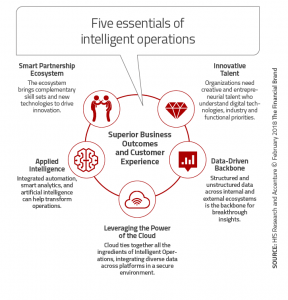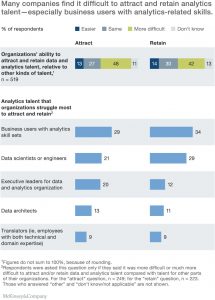This ain’t no Westworld. BB-8 and R2-D2 won’t be coming soon to an online retailer near you. Yet artificial intelligence is here and now, thanks to a once-in-a-generation confluence of information technologies: abundant quality data, predictive analytics, and infinitely adaptive cloud infrastructure.
Anyone reading the tech press lately can be excused for thinking, “I’ve seen this movie before.”
The artificial intelligence hype machine is on overdrive… again. Allied Market Research predicts that the market for Artificial Intelligence as a Service will skyrocket from $2.39 billion in total revenue in 2017 to $77.04 billion in 2025. That represents a whopping compound annual growth rate of 56.7 percent. Business Insider offers an overview of the study findings.
(Personally, I’m waiting for the Burgers and Beer by the Pool as a Service market to take off, but as with AI, BBPaaS is going to take more than wishful thinking.)
Some say we have entered the first of the three stages of AI, as described by Anjali UJ on Analytics Insight. Many current product purporting to be AI-based use ‘narrow’ AI, which focuses on a single task and operates in a limited context. This encompasses weather prediction, sales forecasts, purchase suggestions, and similar uses.
By contrast, artificial ‘general’ intelligence is intended to solve novel, unpredictable problems by applying reason and context, as a human would. Lastly, artificial ‘super’ intelligence actually surpasses human cognitive capabilities, which is fodder for utopians and dystopians alike (i.e. Skynet).
One of the hot buzzwords of 2018 has been AIOps’ using those narrowly scoped use cases to help IT operate smarter. A prime example is the Morpheus multi-cloud management platform, whose Intelligent Analytics applies machine learning to gain fresh insight into how your VMs, containers, and public clouds are being used. Morpheus’s AI-based remediation lets you resize app components, set power schedules, and collect information on brownfield installations. As we evolve this engine in 2019 we’re looking at application dependency mapping, DevOps pipeline productivity, and other exciting use cases.

SOURCE: Successful business process transformation depends on five factors as the foundation of an agile, flexible, and responsive organization. Source: HfS Research and Accenture, via the Financial Brand
AI’s rosy future depends on cloud services — and a big dose of reality
Without the availability of cloud services, much of the promise of AI would never translate into business success. Information Age‘s Nick Ismail states that the AI model depends on the cloud in two ways: the data sets that are the lifeblood of AI applications would not be accessible without cloud services; and the scalability and cost efficiency required to run data-intensive apps affordably are impossible to furnish without the public cloud.
In addition to accessibility and affordability, cloud-based AI addresses the shortage of skilled AI practitioners to create the applications. One of the main drivers of multi-cloud adoption is the fact that different cloud providers have different native services, some of which are better suited for different types of AI applications. It’s one reason multi-cloud management has heated up as it allows IT to align projects to the best execution venue. Even for on premises projects there is a requirement to rapidly deploy new databases and application stacks. This to plays to the strengths of DevOps-centric multi-cloud management platforms such as Morpheus. Want a 7-node big data cluster with a seed data set? Hit the easy button.
So what’s holding up adoption of AI-based cloud services? To start with, there are the challenges of securing and maintaining regulatory compliance for the massive amounts of data AI apps require. Equally daunting for many companies is the complexity entailed in developing, deploying, and maintaining AI applications. As a result, firms are choosing to partner with cloud services that give business managers access to advanced analytics tools without the need for extensive training in how to put them to use.
Capture more value in less time to make better decisions
Everybody knows data is valuable, but not many companies know how the value of their data affects the bottom line. A McKinsey Global Institute briefing states that the growth in the volume of data collected by organizations hasn’t been matched by commensurate growth in revenue and profit. Many companies are applied advanced analytics to gain a competitive advantage through faster evidence-based decision making, insight generation, and process optimization.
The McKinsey report outlines the components of effective analytics transformations:

What sets cloud management platforms such as Morpheus apart as drivers of advanced analytics is the ability to create new services quickly from existing underlying core services, as Forbes Technology Council member Kristof Kloeckner writes. New AI services are available first on the cloud, which heightens the cloud’s influence on standards. Standardization enables the automation that is a prerequisite for manageabiility at scale and “industrial strength service delivery.”
Another benefit of cloud standardization and automation is “DevOps for AI,” which Kloeckner believes will result in accelerated service delivery lifecycles and faster business cycles. If data is the raw material of the 21st century, AI is the refinery, and optimized business processes are the end product. This self-reinforcing chain will accelerate to keep pace with changing markets only if data science and DevOps skills are available, and your company’s stakeholders agree on a clear strategy that identifies intended benefits and management risks.
See how Morpheus can help your organization bring your DevOps team up to speed, plan a winning cloud strategy, and mitigate management risks.